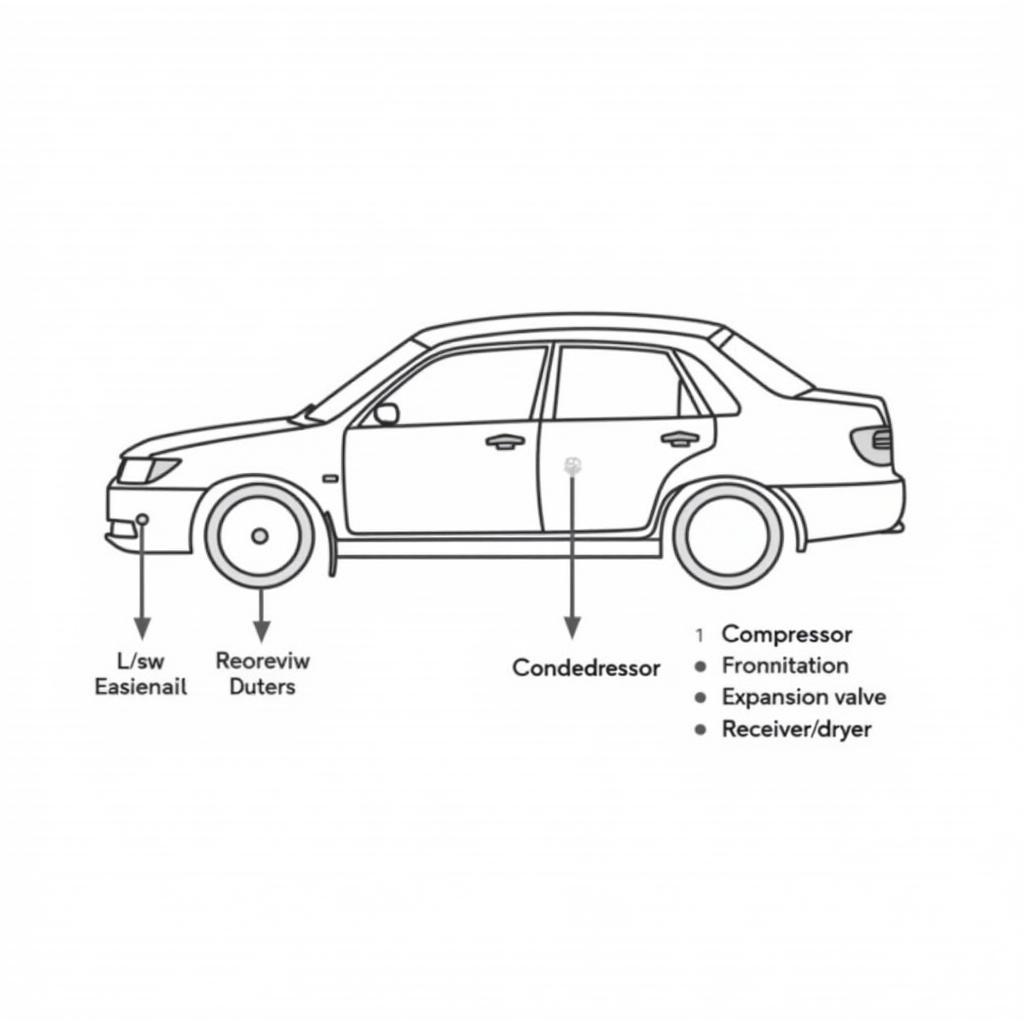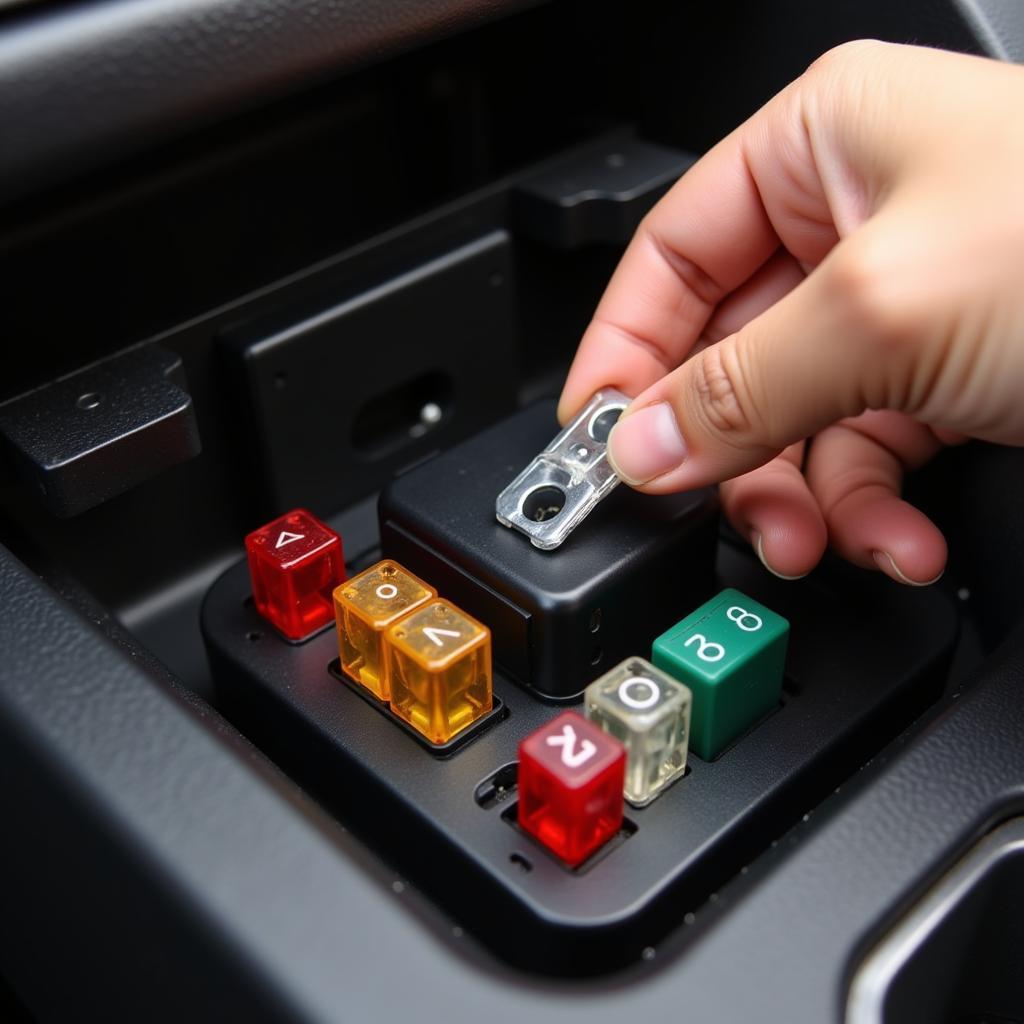Keeping your car’s air conditioning (AC) in top condition is crucial, especially during hot weather. A malfunctioning AC can make driving uncomfortable and even dangerous. This guide provides a comprehensive overview of common car AC problems, how to diagnose them, and how to Fix Air Con Car effectively. We’ll explore everything from simple DIY fixes to more complex issues that require professional help. You can find some handy tips for getting your air conditioning fixed in car in our other guides.
Is your car AC blowing hot air? Or perhaps it’s making strange noises? Don’t worry, you’re not alone. These are common problems and often have straightforward solutions. This article will equip you with the knowledge you need to tackle these issues head-on and get your car’s AC back to its cooling best. For those looking for professional assistance, check out where can I get my car air conditioning fixed.
Identifying Common Car AC Problems
Before attempting any fix air con car solutions, it’s crucial to pinpoint the source of the problem. Here are some common culprits:
- Low Refrigerant: This is the most common cause of a malfunctioning AC. Symptoms include warm air blowing from the vents and a noticeable decrease in cooling power.
- Leaks in the System: Refrigerant leaks can occur in various parts of the system, such as hoses, connections, or the compressor. These leaks can lead to low refrigerant levels and reduced cooling efficiency.
- Electrical Issues: Problems with the AC’s electrical components, such as fuses, relays, or the control module, can prevent the system from functioning correctly.
- Compressor Failure: The compressor is the heart of the AC system. If it fails, the system won’t be able to circulate refrigerant, resulting in no cold air.
- Clogged Condenser or Evaporator: These components can become clogged with debris, restricting airflow and reducing cooling capacity. A smelly AC can also indicate a clogged evaporator. You might want to learn how to fix a stinky car air conditioner.
- Blocked or Damaged AC Lines: Debris or damage to the AC lines can impede refrigerant flow, affecting the system’s performance.
 Car AC System Components Diagram
Car AC System Components Diagram
DIY Fixes for Your Car AC
Some AC issues can be resolved with simple DIY fixes. However, always remember to exercise caution and consult a professional if you’re unsure about any procedure.
- Check the Refrigerant Level: You can purchase a refrigerant recharge kit at most auto parts stores. However, if the refrigerant level is low, it usually indicates a leak, which requires professional attention.
- Inspect the Fuses and Relays: Locate the AC fuses and relays in your car’s fuse box (usually under the dashboard or in the engine compartment). Check for any blown fuses or faulty relays. Replace them if necessary.
- Clean the Condenser: The condenser is located at the front of the car, often behind the grille. Carefully clean it using a garden hose or compressed air to remove debris and improve airflow.
 Checking Car AC Fuse
Checking Car AC Fuse
When to Seek Professional Help
For more complex issues like compressor failure, leaks, or electrical problems, it’s best to seek professional help. A qualified technician has the tools and expertise to diagnose and repair these problems correctly. You may want to know more about who fix car air conditioner.
“A seemingly simple AC problem can sometimes be a symptom of a larger issue. It’s always better to get a professional diagnosis to avoid further damage and costly repairs down the line,” says John Davies, Senior Automotive Technician at Reliable Auto Repairs.
Maintaining Your Car’s AC System
Regular maintenance can prevent many AC problems and extend the life of your system. Here are some essential maintenance tips:
- Regular AC Service: Have your car’s AC system serviced annually by a qualified technician. This includes checking the refrigerant level, inspecting for leaks, and cleaning the system.
- Run the AC Regularly: Even during colder months, run your AC for a few minutes each month to keep the seals lubricated and prevent leaks.
- Cabin Air Filter Replacement: Replace the cabin air filter regularly (every 12,000-24,000 miles or as recommended by your car’s manufacturer) to ensure clean air circulation and prevent clogging of the evaporator.
Conclusion
Fixing your car’s AC doesn’t have to be a daunting task. By understanding common problems and following the troubleshooting tips in this guide, you can fix air con car issues effectively. Remember, regular maintenance is key to keeping your AC in optimal condition and ensuring a comfortable driving experience. If you need assistance, don’t hesitate to contact AutoTipPro at +1 (641) 206-8880 or visit our office at 500 N St Mary’s St, San Antonio, TX 78205, United States.
For more in-depth information on specific car AC repairs, check out how to fix your car’s AC compressor.
FAQ
- How often should I recharge my car’s AC? Ideally, you shouldn’t need to recharge your AC frequently. If you find yourself recharging often, it indicates a leak that needs to be addressed.
- What’s the average cost to fix a car AC? The cost can vary depending on the problem. Simple fixes like replacing a fuse can be inexpensive, while major repairs like compressor replacement can be more costly.
- Can I use any refrigerant to recharge my car’s AC? No, use only the refrigerant type specified for your car. Using the wrong type can damage the system.
- How can I tell if my car’s AC compressor is bad? Signs of a bad compressor include loud noises, warm air blowing from the vents, and a noticeable decrease in cooling power.
- Why is my car AC blowing hot air intermittently? This could be due to a variety of issues, such as low refrigerant, a faulty compressor clutch, or electrical problems.
- Is it safe to drive with a broken AC? While it’s not necessarily unsafe, driving with a broken AC can be uncomfortable, especially during hot weather. It can also be distracting if you’re constantly adjusting the temperature controls.
- How can I prevent my car AC from smelling bad? Regularly replacing the cabin air filter and ensuring proper drainage of the evaporator can help prevent bad odors. You may want to know who fix car air conditioner to properly solve this issue.
“Preventative maintenance is the best way to avoid costly AC repairs. A little care can go a long way in keeping your system running smoothly,” advises Maria Sanchez, Certified Automotive HVAC Specialist.






Leave a Reply